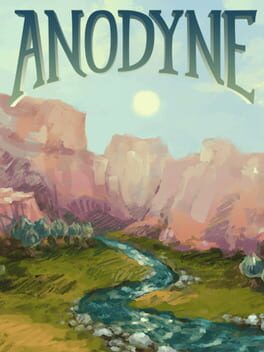There's one truly inspired moment in Anodyne. I won't spoil it here, but it has to do with a context-sensitive action surprising the player with an unexpected outcome. I play games for moments like this: that catch me off guard and enlighten my understanding of game design. Overall, I feel pretty mixed on Anodyne, so I thought it best to start with the positive. Of every game I've rated below 2.5 stars, Anodyne is the one I'm most glad to have played, purely because of its willingness to surprise.
That said, Anodyne's downfall stems from how plain its inspirations are. Anodyne is Zelda meets Yume Nikki. This isn't necessarily a problem: Zelda and Yume Nikki are among the most influential, especially for indie games. The problem is, taking so much from such landmark titles invites a comparison that is seldom favorable.
Much like Zelda, Anodyne is a top down dungeon crawler. Anodyne's main innovation is using a Broom as a weapon: it functions much like a sword, but it has the added ability to pick up and place down dust. Unlike Zelda, there are no dungeon items, and few upgrades to speak of: every dungeon is designed entirely around the Broom. There are a few interesting puzzle solving applications of the broom: you can use dust to swim across water, or to block projectiles, or to power moving platforms. This central mechanic isn't horribly shallow, but it definitely lacks enough depth to support 6 dungeons. The result is, in spite of its short length, Anodyne feels quite repetitive, and easily wears out its welcome.
Much like Yume Nikki, Anodyne is an exploration-focused game taking place in the protagonists subconscious. Though I think Anodyne is a decent Zelda-like game, I really feel like it misses the mark on this front. Yume Nikki is gripping not just because of the surreal imagery, but because said imagery communicates something about the protagonist. Yume Nikki has a section that switches to an 8-bit art style--but this makes perfect sense considering Madotsuki owns a Famicom in the real world.
Anodyne also has a sudden 8bit section. But, what does this tell us about our protagonist, Young? Not much. After the 8-bit area, Anodyne drops all pretense and shoves the player into a Circus-themed dungeon for seemingly no reason.
Overall, Anodyne's setting captures all of the weaknesses of dreamlike settings, and none of the strengths. Anodyne feels incredibly lazy: It doesn't want to put in the work to establish a consistent setting, nor does it put effort into making its surreal imagery symbolically resonant like Yume Nikki does.
Ultimately, Anodyne blindly copies from Zelda and Yume Nikki, while embodying none of the lessons those games actually taught. It's not horrible, but its a long way from greatness.
That said, Anodyne's downfall stems from how plain its inspirations are. Anodyne is Zelda meets Yume Nikki. This isn't necessarily a problem: Zelda and Yume Nikki are among the most influential, especially for indie games. The problem is, taking so much from such landmark titles invites a comparison that is seldom favorable.
Much like Zelda, Anodyne is a top down dungeon crawler. Anodyne's main innovation is using a Broom as a weapon: it functions much like a sword, but it has the added ability to pick up and place down dust. Unlike Zelda, there are no dungeon items, and few upgrades to speak of: every dungeon is designed entirely around the Broom. There are a few interesting puzzle solving applications of the broom: you can use dust to swim across water, or to block projectiles, or to power moving platforms. This central mechanic isn't horribly shallow, but it definitely lacks enough depth to support 6 dungeons. The result is, in spite of its short length, Anodyne feels quite repetitive, and easily wears out its welcome.
Much like Yume Nikki, Anodyne is an exploration-focused game taking place in the protagonists subconscious. Though I think Anodyne is a decent Zelda-like game, I really feel like it misses the mark on this front. Yume Nikki is gripping not just because of the surreal imagery, but because said imagery communicates something about the protagonist. Yume Nikki has a section that switches to an 8-bit art style--but this makes perfect sense considering Madotsuki owns a Famicom in the real world.
Anodyne also has a sudden 8bit section. But, what does this tell us about our protagonist, Young? Not much. After the 8-bit area, Anodyne drops all pretense and shoves the player into a Circus-themed dungeon for seemingly no reason.
Overall, Anodyne's setting captures all of the weaknesses of dreamlike settings, and none of the strengths. Anodyne feels incredibly lazy: It doesn't want to put in the work to establish a consistent setting, nor does it put effort into making its surreal imagery symbolically resonant like Yume Nikki does.
Ultimately, Anodyne blindly copies from Zelda and Yume Nikki, while embodying none of the lessons those games actually taught. It's not horrible, but its a long way from greatness.
